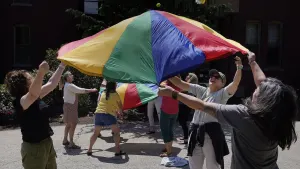More Stories
The U.S. has the highest single-day total of nearly 300,000 coronavirus cases. That is the highest single-day total since the start of the pandemic, according to data compiled by Johns Hopkins University.
Today, people who were the first to get the Pfizer vaccine are due for their second dose. It's been 21 days since vaccinations started.
The goal was to get 20 million people vaccinated by the end of 2020, but that didn't happen. So far, more than 4.2 million people in the U.S. have received their first doses of the COVID-19 vaccine.
And just hours ago, Britain gave the first patient in the world the Oxford-AstraZeneca vaccine. It's the first health service to deploy the AstraZeneca shot, which can be stored at normal refrigerator temperatures. The British government has secured access to 100 million doses. More than half a million doses are available today.
Some experts say the US needs to speed up the COVID-19 vaccination process. This morning, News 12's Elizabeth Hashagen was joined by Dr. Peter Hotez to discuss what happens next, and why some people are apprehensive about getting the vaccine.
Dr. Hotez is the dean of the National School of Tropical Medicine at Baylor College of Medicine in Houston, and co-director of the Texas Children's Hospital Center for Vaccine Development.
There's intensifying concern that the COVID-19 vaccine distribution has been slower than expected. Below is what Dr. Hotez has to say about the distribution plan and how to vaccinate a large amount of Americans:
There's an idea of cutting the Moderna vaccine doses in half so more people get shots. Dr. Anthony Fauci cautioned that the government shouldn't deviate from the doses and schedules used in clinical trials on the vaccines. Dr. Hotez agrees with Dr. Fauci, this is why:
Last week, the U.K. shifted its guidance to get as many people as possible their first dose, while potentially delaying the second dose, sparking concern among scientists who say there is no evidence to suggest the vaccine is effective without completing the full regimen. This is what Dr. Hotez had to say about the guidance and the new variant of the virus:
We know the TSA screened more than 1.3 million people Sunday, more than any other day since the start of the pandemic. This means more than 17 million people were screened at TSA checkpoints for the entire holiday travel period, beginning Friday, Dec. 18 and ending Sunday, Jan. 3. What kind of impact is this expected to have? Dr. Hotez discusses travel and health strategies to help you stay safe:
More from News 12
1:28

5 simple steps for long-term benefits to your health and heart
1:32

8 tips for working safely during hot weather
3:31

Guide: Ways to set your child up for financial success
3:18

Guide: The importance of good sleep and how to get it

Guide: Mental health resources available in the tri-state
9:36
